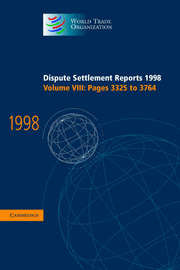Australia - Measures Affecting Importation of Salmon (WT/DS18): Report of the Appellate Body
Published online by Cambridge University Press: 22 December 2017
Summary
INTRODUCTION
Australia and Canada appeal from certain issues of law and legal interpretations in the Panel Report, Australia - Measures Affecting Importation of Salmon. The Panel was established to consider a complaint by Canada regarding Australia's prohibition on the importation of fresh, chilled or frozen salmon from Canada under Quarantine Proclamation 86A (“QP86A”), dated 19 February 1975 and any amendments or modifications thereto.
Before the promulgation of QP86A on 30 June 1975, Australia imposed no restrictions on the importation of salmonid products. QP86A “prohibit[s] the importation into Australia of dead fish of the sub-order Salmonidae, or any parts (other than semen or ova) of fish of that sub-order, in any form unless: […] prior to importation into Australia the fish or parts of fish have been subject to such treatment as in the opinion of the Director of Quarantine is likely to prevent the introduction of any infectious or contagious disease, or disease or pest affecting persons, animals or plants”. Pursuant to QP86A and in accordance with the authority delegated therein, the Director of Quarantine has permitted the entry of commercial imports of heat-treated salmon products for human consumption as well as non-commercial quantities of other salmon (primarily for scientific purposes) subject to prescribed conditions. Canada requested access to the Australian market for fresh, chilled or frozen, i.e., uncooked, salmon. Australia conducted an import risk analysis for uncooked, wild, adult, ocean-caught Pacific salmonid product (“ocean-caught Pacific salmon”). This category of salmon is to be distinguished from the other categories of salmon for which Canada seeks access to the Australian market (“other Canadian salmon”). The risk analysis on ocean-caught Pacific salmon was first set forth in the 1995 Draft Report, revised in May 1996 and finalized in December of 1996 (the “1996 Final Report”). The 1996 Final Report concluded that:
… it is recommended that the present quarantine policies for uncooked salmon products remain in place.
The Director of Quarantine, on the basis of the 1996 Final Report, decided on 13 December 1996 that:
… having regard to Australian Government policy on quarantine and after taking account of Australia's international obligations, importation of uncooked, wild, adult, oceancaught Pacific salmonid product from the Pacific rim of North America should not be permitted on quarantine grounds.
- Type
- Chapter
- Information
- Dispute Settlement Reports 1998 , pp. 3327 - 3406Publisher: Cambridge University PressPrint publication year: 2001
- 1
- Cited by

